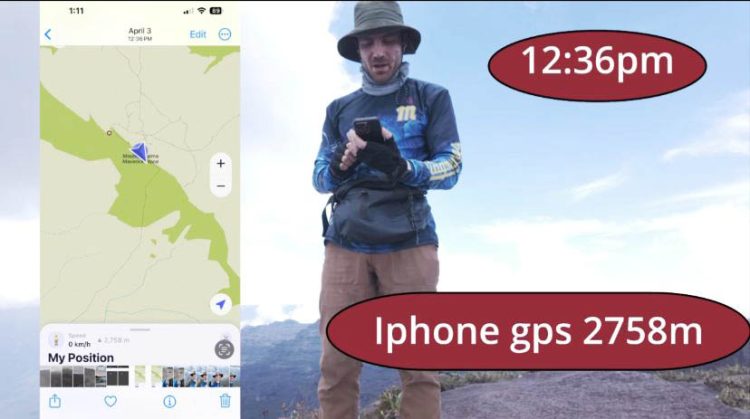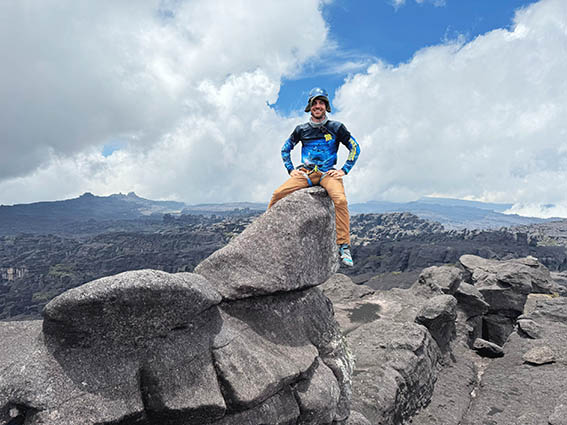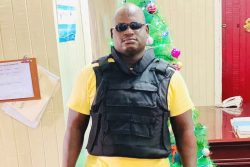By Milton Grannum
Mount Roraima, the iconic flat-topped mountain spanning the borders of Guyana, Venezuela, and Brazil, has long captivated adventurers and geographers. Traditionally, its highest point was believed to be Maverick’s Point, located in Venezuela. However, British adventurer Charlie Bicknell, who is on a mission to climb South America’s tallest peaks, claims that the highest point of Mount Roraima is actually “Dragon’s Fortress,” a rocky peak situated in Guyana.
Bicknell’s findings challenge decades of geographical understanding. Historically, Mount Roraima is described as a 9-mile (14 km) long plateau rising to 9,094 feet (2,772 meters) and serving as the source of several rivers, including tributaries of the Amazon and Orinoco. It has also been recognized as the highest point in Guyana.

According to Bicknell, however, Dragon’s Fortress surpasses Maverick’s Point by an estimated 30 to 40 meters. After conducting multiple measurements during his expeditions, Bicknell is confident in his assertion.
“Every single measurement I took was consistent,” he told the Sunday Stabroek in a recent interview. “The Dragon’s Fortress in Guyana is taller, without a doubt.”
Bicknell’s quest to prove Dragon’s Fortress is Mount Roraima’s true highest point was fraught with challenges. His first attempt, in July 2023, ended in failure due to relentless rain, treacherous terrain, and inadequate climbing equipment.
“The weather was relentless,” Bicknell said. “Roraima is one of the rainiest places on Earth, and every step we took was slippery and dangerous.”
To make matters worse, Bicknell’s drone, a vital tool for scouting the mountain’s labyrinthine terrain crashed early in the climb. Without it, his team had to scale a smaller mountain to gain visibility of their surroundings. “We didn’t have enough climbing equipment, and our packs were huge because we carried extra food and gas,” he recalled. “The radio wasn’t working, so if someone had been injured, we would’ve had no way to call for help.”
After the failed attempt, Bicknell spent two weeks in the nearby village of Kumarakapay, waiting for assistance from a seasoned Venezuelan climber. Reflecting on this period, he admitted feeling demoralised.
“I had spent all my money and time on the first expedition, and it felt like nothing had come of it,” he said.
However, a breakthrough came when a Venezuelan climber agreed to help if Bicknell could fund the logistics. With renewed determination, Bicknell planned a second expedition.
Success in the dry season
In April 2024, Bicknell returned to Mount Roraima with an experienced team of four Venezuelan climbers, upgraded equipment, and another drone. This time, they chose to climb during the dry season to avoid the slippery conditions of the earlier attempt.
Using a drill to create belay points for safety, the team ascended Dragon’s Fortress over several days. Despite the challenges of navigating dense jungle and rugged rock formations—and dealing with biting insects Bicknell’s team successfully reached the summit.
“We were much more prepared this time,” he said. “The dry season made climbing less precarious, and the drone was instrumental in scouting the route.”
The evidence
During the second expedition, Bicknell conducted nine altitude measurements using GPS devices and a barometer. His findings include:
Dragon’s Fortress: Approximately 2,797 meters
Maverick’s Point: Approximately 2,757–2,758 meters Bicknell acknowledges that more precise instruments are needed to confirm the exact altitude, but his measurements consistently show that Dragon’s Fortress is taller than Maverick’s Point by a significant margin.
If verified, Bicknell’s claim would challenge the longstanding belief that Maverick’s Point is the tallest point on Mount Roraima. The discovery could have significant implications for Guyana’s tourism industry he says.
“Mount Roraima already attracts global visitors for its stunning landscapes and unique ecosystems. Recognition of Dragon’s Fortress as the mountain’s highest point could redirect attention to Guyana’s side, potentially boosting ecotourism and creating economic opportunities for local communities. This discovery is not just about setting records,” Bicknell said. “It’s about exploring the unknown and bringing attention to the hidden wonders of South America.”
Reflecting on his arduous journey, Bicknell admitted feeling disheartened after his initial failure. “I honestly felt like giving up,” he said. “I could have claimed Maverick’s Point and moved on, but I knew in my heart that Guyana’s tallest point remained undiscovered.”
His persistence paid off during the successful second expedition. “When we finally confirmed that Dragon’s Fortress is the highest point, I felt blessed by God and grateful for the achievement,” he said.
What’s next?
Bicknell’s mission to climb the tallest mountains in all South American countries continues. Having already summited eight peaks, he plans to climb Suriname’s highest mountain this month but is hoping to raise enough funds or is hoping that a company in Guyana which owns a helicopter or the Government can fly him to where he needs to go.
He documents his adventures on social media under the handles Charlieviaja (Instagram) and Charlie Jon Bicknell (Facebook). Supporters can also reach him via WhatsApp at +506 8770-2766. Bicknell welcomes followers and donations to help fund his ongoing journey.











